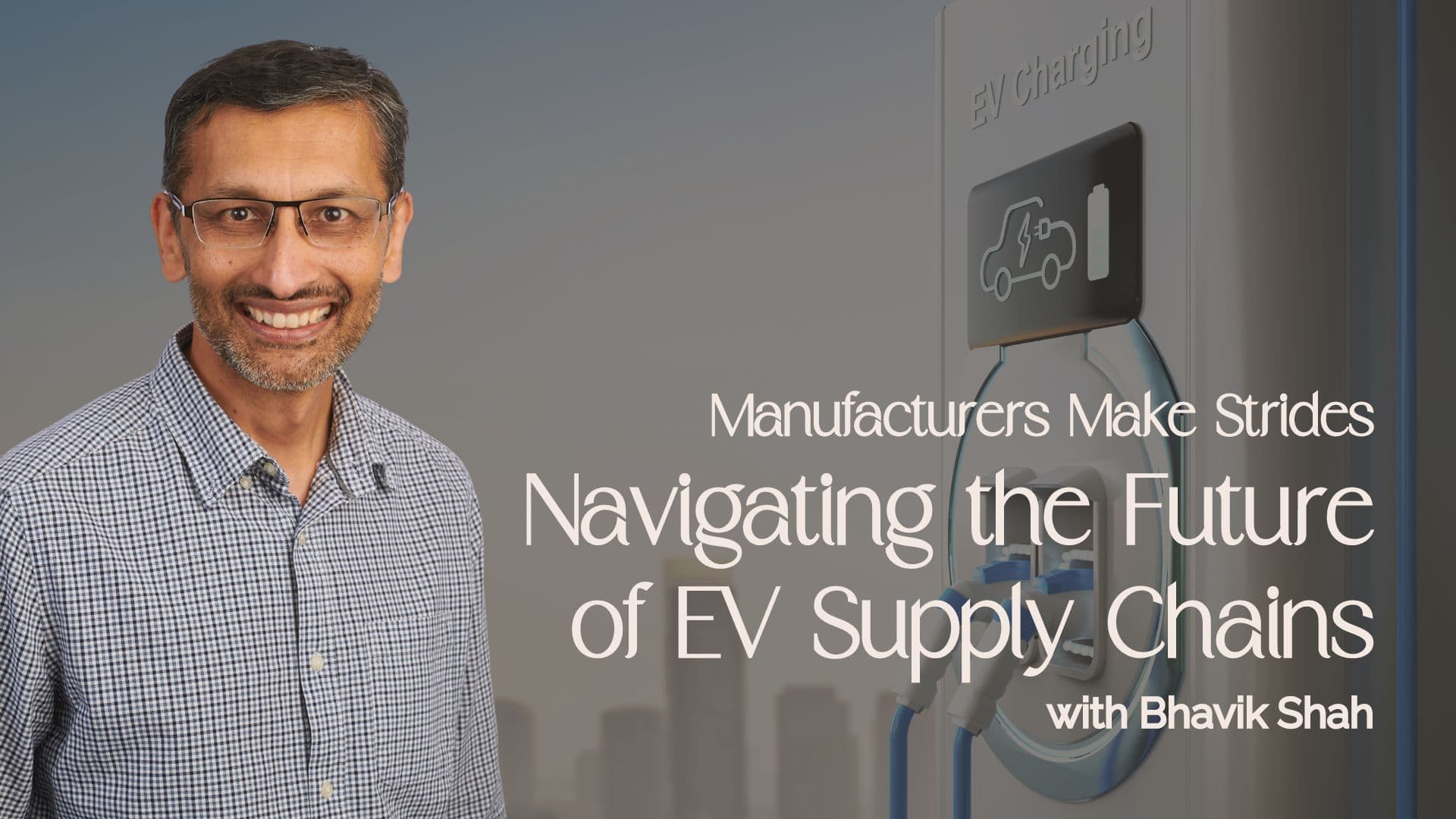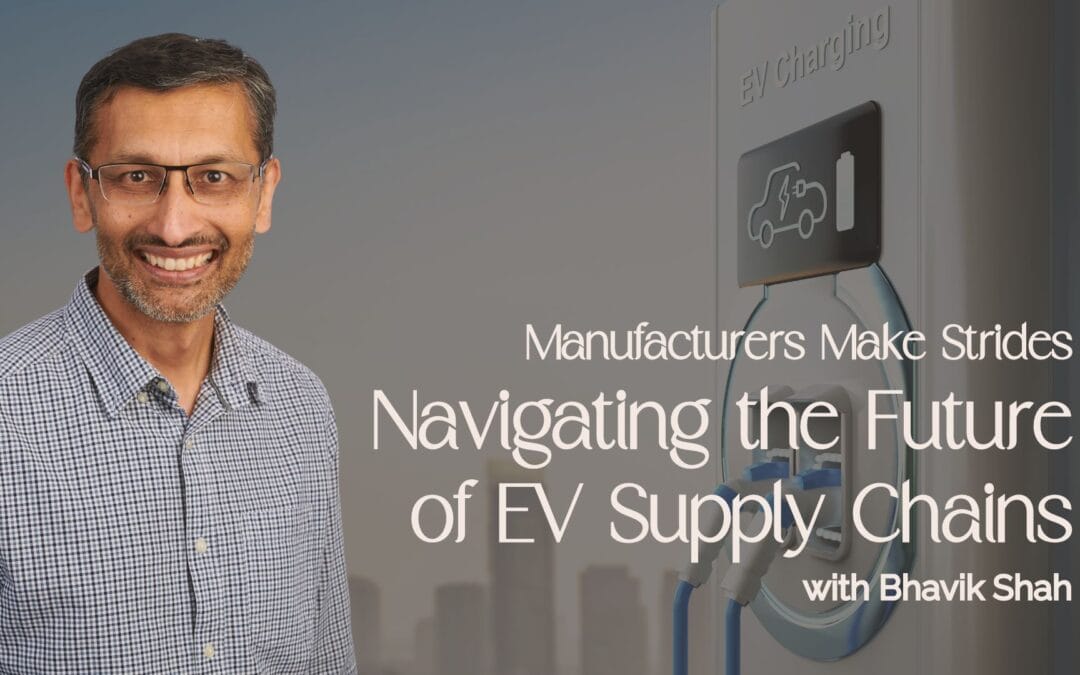Navigating the Future of EV Supply Chains with Bhavik Shah

Introduction
Hey there, welcome to another episode of the Manufacturers Makes Strides podcast. I’m your host, Martin Griffiths. Joining us today is Bhavik Shah, an electric vehicle technology expert and the business growth manager at Unipart Automotive. Bhavik has over three decades of experience in automotive manufacturing, with the last 10 years focused on vehicle electrification.
In our conversation today, we’ll explore the future of vehicle electrification, strategies to foster innovation and growth, and the realities of building a sustainable supply chain in this evolving sector. Bhavik will also share his insights from years of mentoring and leading in the electrified automotive manufacturing space. Stay tuned for an insider’s perspective on driving growth and innovation in vehicle electrification.
Embrace Data-Driven Manufacturing
Jumpstart your journey with our free Digital Transformation Starter Kit. Gain the insights to make smarter decisions and elevate your manufacturing process.
In this article:
Martin: Hey Bhavik, really good to have you on the podcast today. How are you doing?
Bhavik: Hi Martin. Very good. It’s a sunny day in Coventry. You picked a good week to chat with me.
Martin: You have vast expertise in automotive and electric vehicles. What got you into the automotive sector?
Bhavik: Sure. Chance in an unusual circumstance. I graduated in aeronautical engineering at Imperial College in ’94. The defense sector was on the downturn. So, I had a fantastic opportunity as a grad to join Ove Arup. They were seeding new technology in computer-aided engineering, very complex systems sold on a supercomputer. They were looking for young talent, which brought me into mechanical engineering and vehicle simulation. That’s been ongoing for 30 years now in different ways.
Optimise Now,
Scale for the Future
Our Digital Transformation Starter Kit is your key to immediate operational gains and future-proof growth strategies.
Martin: How do you see the transition from internal combustion engines to electric or hybrid vehicles? What’s your take on the current landscape and what happens next?
Bhavik: Transport is massively changing. About 25 percent of global greenhouse gases come from transport. It’s a major focus for climate policies. It’s also a very solvable issue compared to sectors like agriculture or industrial waste. The UK Climate Committee identified transport as a key area to address. Electric vehicles aren’t new, but mass production is. Automotive manufacturers saw the problem, and industry was willing to act. Electrification is a near-term win, but it’s still only 25 percent of the problem. Globally, there’s still a gap, with China, Europe, and the U.S. leading in electric vehicle sales.
Martin: You know, looking at manufacturing businesses and the supply chain, what are some critical factors companies need to consider when transitioning to electrification?
Bhavik: It’s a complex dilemma. Electrification is a whole platform change, requiring large investments. The supply chain also needs to change, involving CapEx and OpEx on both assembly and supply chain sides, and there’s a global aspect due to electronics content. Supply chain issues and shortages are common. Technology is rapidly changing, from battery cell format to chemistry, size, and packaging, making it hard to make money before mass market readiness. Adoption isn’t guaranteed, as consumers still choose between electric and petrol cars. The fascinating part for me is the link to the energy system. Companies need to connect their products with energy, looking at it as an ecosystem. This is why Tesla is in the charging market and VW offers green electricity. It’s about creating a complete experience for the consumer.
Martin: So, is it about covering the whole experience for the consumer, ensuring they have an easy way to keep their car charged? Or is it about addressing concerns that the energy for electric cars should come from sustainable sources?
Bhavik: That’s a great topic for discussion. Yes, manufacturers need to understand the full needs of the consumer, but there’s also the infrastructure challenge. We’ve had this fuel available for a hundred years, with a massive infrastructure grid. Tesla had to create superchargers to make their product viable. Regarding the energy mix, early adopters bragged about zero emissions, but if the electricity comes from coal, it’s not a green solution. Battery production also involves significant energy and materials. The industry uses life cycle analysis (LCA) to compare energy use and raw materials, aiming to minimize the LCA across the supply chain.
Boost Traceability
Enhance traceability with our free Digital Transformation Starter Kit. Get tools to monitor production, improve quality control, and ensure compliance.
Martin: You mentioned challenges with the clear vision for the industry to achieve fully sustainable, zero emissions, but there’s a changeable landscape of tech and demands. How do businesses navigate that? What’s your advice on how businesses should navigate it while keeping the team in mind and avoiding chaos?
Bhavik: Chaos isn’t great for growth. It’s good for innovation and small-scale growth, but not for large-scale growth. Companies need to build nimble and agile manufacturing and production supply chains, ready for technology changes. The connection between energy and product is crucial, as money may come from the energy aspect or data running it. Data is now fundamental in automotive, and energy is also important.
Collaboration is key. It brings de-risking through shared investment and fosters supply chain innovation. Vertical integration isn’t always best in this industry yet, so pockets of excellence need to come together. Matchmaking among players in the ecosystem is vital. I spent time in a government role at the Advanced Propulsion Centre with large collaboration projects, which are crucial for UK automotive innovation and industrialization. These projects help bridge the “valley of death” between pilot stages and industrialization, where risk and CapEx are high. Collaboration through grant funding is a magic bullet.
Martin: Do you think collaboration brings in skills or expertise that may be missing from traditional automotive companies, like data analytics?
Bhavik: Yeah, it could be data-led or energy collaboration. For instance, working with a charging infrastructure company instead of having our own chargers. Collaborating with large battery producers instead of building our own gigafactory. Collaborating with experts in electronics and electrical fields can help us grow rapidly. Companies like Ford and VW are already investing in other companies for battery technology and cloud-based solutions. It’s a great model for innovation and de-risking.
Martin: Brilliant. What excites you most about leading growth in EV supply chains?
Bhavik: Electrification is game-changing with no shortage of challenging problems, which I thrive on. It’s changed everything from powertrains to refueling approaches. Integrating the use of energy is now crucial. For example, using vehicle-to-grid (V2G) or vehicle-to-house systems. Innovation is massive, but commercialization is key. I enjoy making products successful and creating revenue growth. I work with SMEs, medium, and large organizations, like Unipart, to grow electrified supply chains.
Enhance Your Lean Manufacturing
Boost your lean manufacturing with our free Digital Transformation Starter Kit. Get a comprehensive guide, work instructions, and capacity planning tools to optimise your processes.
Martin: Brilliant. What excites you most about leading growth in EV supply chains?
Bhavik: Electrification is game-changing with no shortage of challenging problems, which I thrive on. It’s changed everything from powertrains to refueling approaches. Integrating the use of energy is now crucial. For example, using vehicle-to-grid (V2G) or vehicle-to-house systems. Innovation is massive, but commercialization is key. I enjoy making products successful and creating revenue growth. I work with SMEs, medium, and large organizations, like Unipart, to grow electrified supply chains.
Martin: Do you think there’s space for smaller companies in the EV supply chain? Where do SMEs fit into the picture?
Bhavik: Totally. SMEs add immense value to larger corporations with their nimble, agile, and energetic approach. Larger companies can’t move at their pace unless they create mini incubators with SME culture. SME thinking is crucial for innovation. It’s a highly competitive environment, which drives innovation. SMEs might struggle with scale-up or funding, but collaboration with larger corporations or investors can help. They can either grow themselves, stay innovative and small, or work with venture capitalists to chart their path. There are many routes forward, but SMEs often need help navigating these paths. I spend time helping these companies grow in the UK.
Martin: What would your advice be for a company looking to scale up technologies or services focused on the EV supply chain?
Bhavik: SMEs’ biggest challenge is understanding the route to market. They often think a great idea just needs money, but the automotive and energy sectors have their own complications and competition. Scale-up is another key issue. Planning for large-scale production is very different from pilot-level builds. Programs like the Technology Developer Accelerator Program (TDAP) in the UK, run by the Advanced Propulsion Centre (APC), help with mentoring, IP inventory, business cases, and matchmaking to other organizations. This helps SMEs move robustly from TRL 4 to 7, overcoming the “valley of death.” Other programs, like those with the Faraday Institution for batteries and the Driving the Electric Revolution program for motors, are also valuable. SMEs should reach out to these programs for guidance.
Embrace Data-Driven Manufacturing
Jumpstart your journey with our free Digital Transformation Starter Kit. Gain the insights to make smarter decisions and elevate your manufacturing process.
Martin: That sounds really helpful. How do you think UK companies are performing in the global EV market?
Bhavik: It is a race, and I feel we’ve been left a bit behind. China built its infrastructure early with a national program. The U.S. responded with the Inflation Reduction Act, the biggest incentivization program ever. Europe relies on regulation to drive innovation, focusing on sustainability and taxing carbon. The UK, post-Brexit, is doing its own thing, being the first to announce a ban on internal combustion engines, incentivizing Zero Emission Vehicles (ZEVs).
At our peak, we made 2 million vehicles in the UK. We have a production economy, a supply chain economy, and jobs that depend on it. Electrification supply chains are crucial, and we are currently relying more on imports from Europe, Asia, and China. My focus is on growing manufacturing for products where we can be competitive. High performance, novel technology, and manufacturing intelligence are key areas. Government support is essential to ensure companies like JLR, BMW, Nissan, Toyota, and Stellantis keep investing. The next five to ten years will show if we can build a strong supply chain to support these large companies.
Martin: So it’s a key kind of five years to decades coming up.
Bhavik: If that sounds a little scary, it just is the reality of the message right now.
Martin: I just want to dig into one thing you mentioned earlier. You talked about a program with good mentoring. Have any mentors particularly impacted you in your career? Do you think mentoring is important?
Bhavik: I hope so. I’ve benefited from it and helped others who call me a mentor, though I don’t like to use the label. If I can be of help, then it’s mentoring. I’ve had loads of informal mentors, and industry itself is a mentor as a metaphor.
Martin: Yeah. Official mentoring can come with a lot of baggage.
Bhavik: Exactly. Coaching and mentoring aren’t really UK phrases. Early in my career, I had a phenomenal technical mentor, Richard Sturt at Arup, who taught me a lot about technical thoroughness and groundbreaking work. In the U.S., venture capitalists and Tom Gutwald helped me with business success. At Jaguar Land Rover, I had mentors guiding me during the transition out of the PAG group to Tata. In electrification, I’ve continued learning. Every innovation journey benefits from mentors, and I’m grateful to many. Now, I focus on being a business mentor in creativity, growth, and environmental factors. Creating a culture around growth is crucial and often overlooked.
Martin: I just want to dig into one thing you mentioned earlier. You talked about a program with good mentoring. Have any mentors particularly impacted you in your career? Do you think mentoring is important?
Bhavik: I hope so. I’ve benefited from it and helped others who call me a mentor, though I don’t like to use the label. If I can be of help, then it’s mentoring. I’ve had loads of informal mentors, and industry itself is a mentor as a metaphor.
Martin: Yeah. Official mentoring can come with a lot of baggage.
Bhavik: Exactly. Coaching and mentoring aren’t really UK phrases. Early in my career, I had a phenomenal technical mentor, Richard Sturt at Arup, who taught me a lot about technical thoroughness and groundbreaking work. In the U.S., venture capitalists and Tom Gutwald helped me with business success. At Jaguar Land Rover, I had mentors guiding me during the transition out of the PAG group to Tata. In electrification, I’ve continued learning. Every innovation journey benefits from mentors, and I’m grateful to many. Now, I focus on being a business mentor in creativity, growth, and environmental factors. Creating a culture around growth is crucial and often overlooked.
Embrace Data-Driven Manufacturing
Jumpstart your journey with our free Digital Transformation Starter Kit. Gain the insights to make smarter decisions and elevate your manufacturing process.
Martin: I noticed you had some time with mindfulness practices. What benefits do you see from that in your personal and work life? Do you have a daily ritual or practice?
Bhavik: It’s an awkward topic in engineering, especially in a male-dominant environment. It’s not about sitting on a yoga mat.
Martin: I’ll just slightly interrupt you there. I totally agree about the awkwardness. I was asked about this on a flight with a colleague about 20 years ago. He asked if I meditated or read philosophy, and the culture at the time was that engineers didn’t do that. It was very much about hard facts. I think things have moved on now, but there’s still that stigma.
Bhavik: Glad you said that. It’s good to make sure we discuss that. For me, it started with personal adversity. Our son was born very unwell, and that led to a difficult situation at home. As an engineer, you know how to fix things, but when the medical profession can’t solve something, you have to dig deeper. This led to a discovery of the human condition and self-understanding. It’s not just about meditation or mindfulness but realizing we are capable of more than we think.
When COVID came, I was getting lots of questions about this. As a director, I started enacting mindfulness programs at work. The team did mindfulness at lunch, and behaviors in meetings improved, creativity increased, and there was a more positive outlook. We benchmarked it, did a scoring system, and it worked well. Well-being is important, and I support people on their journeys, tackling adversity and fostering creativity.
Martin: That’s fascinating. Sometimes taking five to ten minutes to change the mindset first can make subsequent work flow much easier.
Bhavik: Absolutely. You asked about daily routines. I’ve seen many senior leaders use these practices. Starting the day with self-reflection without the phone allows you to understand your thoughts and have abundant energy to solve things. At the end of the day, decluttering your mind helps. This can be done by watching thoughts escape, writing them down, or processing them. Decluttering helps avoid carrying unresolved issues into sleep, leading to a fresh start the next day.
Martin: Great. Really good advice. Thank you for your time today. Any final thoughts or places where people can learn more about you?
Bhavik: Easy to reach me on LinkedIn. My focus is on growth, encompassing culture, people, tools, and innovation. This podcast is a great platform to discuss these topics. It’s like a pub chat where we can step out of our technology focus and see what makes us tick. I appreciate you setting up this platform.
Martin: Oh, it’s a pleasure. Great to speak to you, Bhavik.
Bhavik: Okay. Cheers.
Final Thoughts:
Thanks for reading! This blog post provides a concise version of our conversation with Bhavik Shah. We covered a range of topics including the future of vehicle electrification, critical factors for companies transitioning to electrification, the importance of collaboration and mentoring, and the role of mindfulness in fostering creativity and productivity. For the full discussion, listen to the podcast on Spotify or watch it on YouTube.
A big thank you to Bhavik Shah for sharing his expert insights and experiences with us. If you enjoyed our discussion, please like and share this post to help us reach more people like you. Don’t forget to subscribe on YouTube or follow us on LinkedIn to catch all of our latest episodes. Join us next time as we delve into the innovations shaping the manufacturing world. I’m Martin Griffiths, thanks for reading and see you in the next episode.
Let’s Talk Tascus
Want to see how Tascus can cut errors,
speed up production, and simplify
compliance in your factory?





